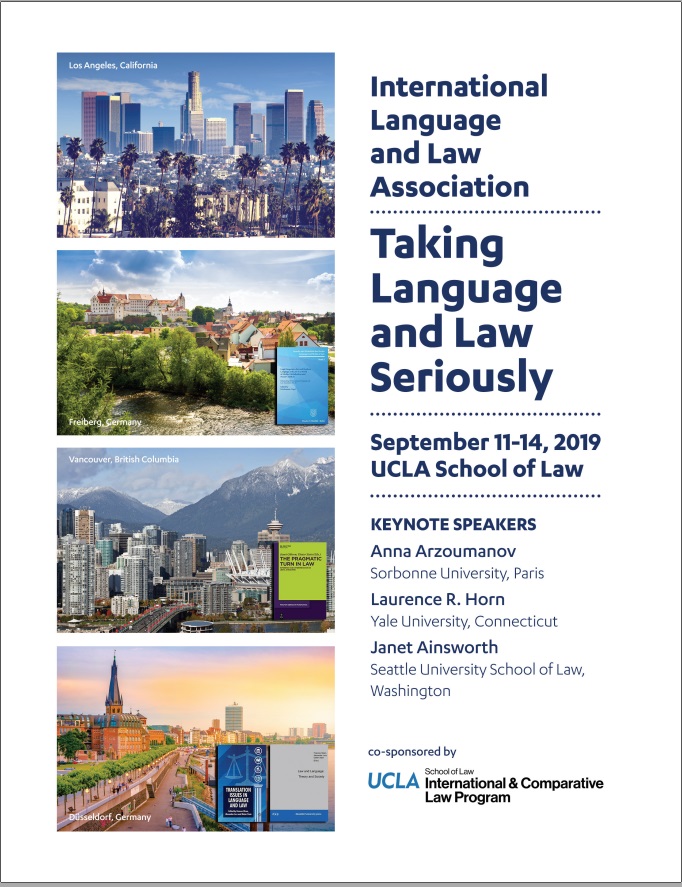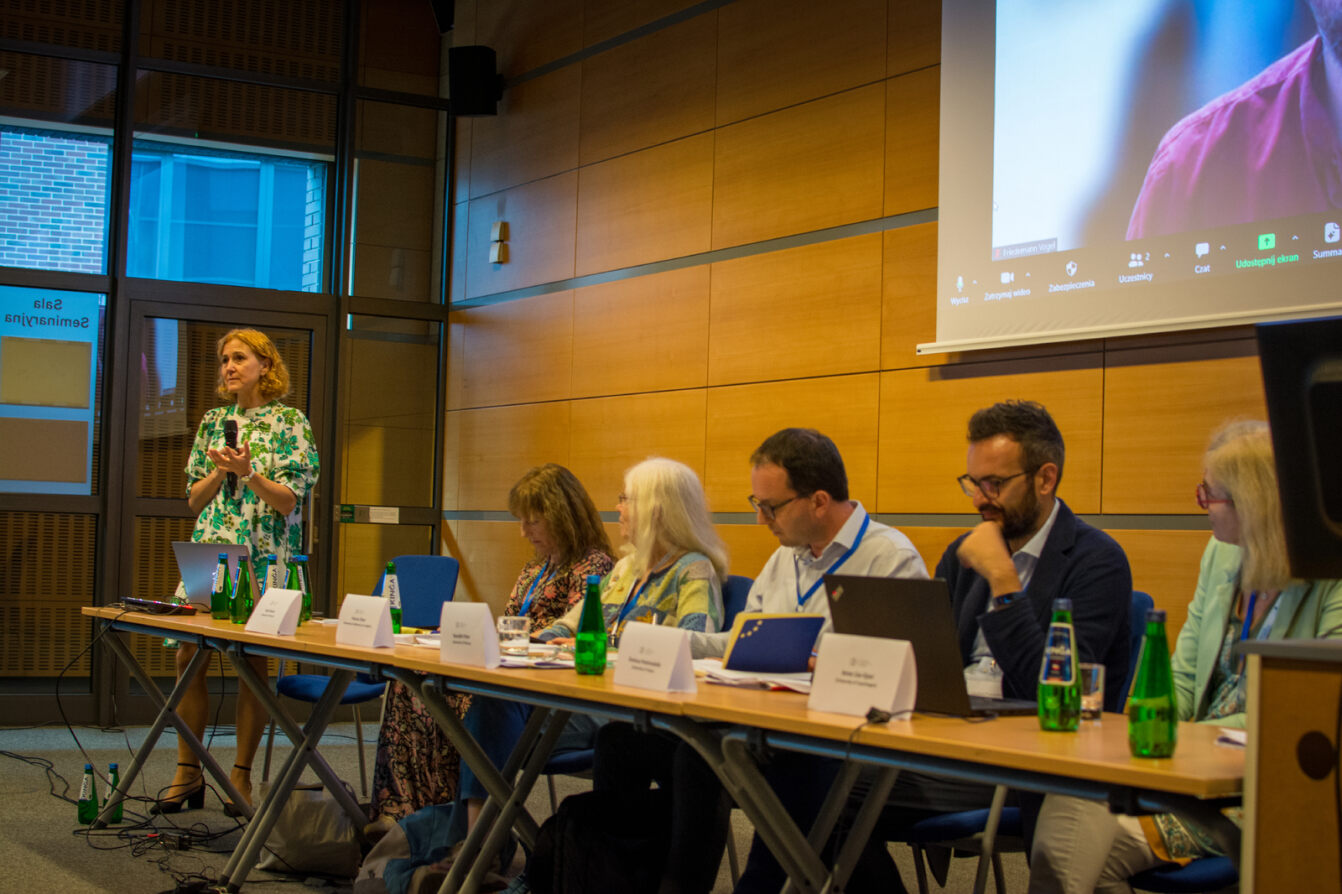 The International Language and Law Association (ILLA), an assemblage of scholars from throughout the world, will hold its fourth general meeting and Conference to extend and deepen the society’s philosophical and theoretical orientation towards the intersection of these two fields of knowledge. Under the theme:
The International Language and Law Association (ILLA), an assemblage of scholars from throughout the world, will hold its fourth general meeting and Conference to extend and deepen the society’s philosophical and theoretical orientation towards the intersection of these two fields of knowledge. Under the theme:
Taking Language and Law Seriously
from September 11-14, 2019
at the University of California at Los Angeles (UCLA) Law School
it will examine Language and Law’s early history, its recent developments, and some of its practical and political significance.
The first event of the Conference will be a focus workshop on Forensic Linguistics, organized by Carole Chaski, Victoria Guillén and Dieter Stein, taking place all day Wednesday, September 11, and Thursday morning, September 12. The Conference fee covers admission to the focus workshop for those who wish to participate in it.
The opening of the general Conference will take place late Thursday afternoon with a plenary session examining the historic and ongoing influence of the late Professor David Mellinkoff’s The Language of the Law (1963), the first textbook for courses on the linguistic basis of law. This will be followed by an evening welcoming reception.
The rest of the plenary sessions and a series of workshops will take place over the next two days (Friday and Saturday, September 13-14).
Primary conference language: English.
Call for Papers: January 31, 2019
Early acceptance (January 15) for proposals submitted before the end of 2018.
This fourth international ILLA Conference is designed to host high-quality presentations of original research. We have reserved spaces for an additional paper on several set panels and encourage anyone working on one of the following areas to submit an abstract to be considered for inclusion on the panel:
- Language as access to social and cultural prejudice in legal discourse
- Language, law and philosophy
- The language of discrimination, harassment and violence
- Theoretical issues arising particularly in translation into and from Asian languages
- La Loi et la Langue dans le monde francophone
- The linguistics of spoken legal discourse
- Language rights: speaking out and getting done in
- The Linguistics and legalistics of "fake news": asserting and lying in mainstream media and in the new media (twitter, Facebook).
In addition to these panels, the conference invites papers on other aspects of legal linguistics, including (but certainly not limited to) such topics as:
- Semiotics, semantics and pragmatics of law
- Legislation and linguistics of norm genesis
- Multilingualism and law
- Philosophical perspectives on language and law
- Language and law in a diachronic and/or culturally comparative perspective
- Law in the context of computer-mediated communication
- Educational aspects of legal linguistics
- Language theories in law and linguistic theories of law
- Discourse and power in the courtroom
- Forensic Linguistics
- Qualitative and computer-assisted quantitative methods in legal linguistics
All contributors are requested to submit an extended abstract of 800–1000 words with title, theoretical background, research questions, methodological approach and main hypotheses.
We also invite posters and panel proposals on any relevant topic. For panel proposals, please explain the topic (1000–1500 words), choose and describe a panel format, especially if unconventional (100 words) and the titles as well as the abstracts (each about 500-800 words) of the planned talks with names, affiliations and contact e-mail addresses. For posters, please submit abstracts with 350–400 words including title, theoretical background, research questions, methodological approach and main hypotheses.
Please submit your proposals by January 31, 2019. We will employ a process of blind peer review but it will be an expedited process. For abstracts and proposals received before the end of the year, we expect to send acceptance letters out January 15, 2019. Although we will continue to review abstracts and proposals received up through March, 2019, we strongly recommend getting them in by January 31, 2019. The sooner we receive your proposal the sooner we will review it and respond and the longer you will have to obtain funding, apply for visas, etc.
Keynotes
- Laurence R. Horn (Yale University)
- Janet Ainsworth (Seattle University)
- Anna Arzoumanov (Université Paris-Sorbonne)
Conference Fees (update)
| Early bird fee, by 30th of April, 2019: | 200,- USD | |
| Registration after 30th of April, 2019: | 250,- USD | |
| Registration on-site: | 300,- USD |
Please note: Participation at this (biannual) ILLA conference includes an ILLA membership for the next two years (more details).
To attend the conference, please
- register via registration form, and
- pay your conference fee via https://commerce.cashnet.com/LABTS
Organizer/Host and Contact
Prof. Frances Olsen
University of California at Los Angeles
Web: https://illa.online
Mail: la2019[at]illa.online
Information on ILLA
The International Language and Law Association (ILLA), founded in 2007, is a network of linguists and lawyers working on the language matrix of law. Language is seen not simply as a subject in the legal context or an object of forensic analysis, but as the central medium of modern constitutional states, the mediator of social conflicts, and the core of legal methodology. This conference follows in a series from Düsseldorf, Germany (2006), to Vancouver, Canada (2014), and Freiburg, Germany (2017). The ILLA has also organized smaller, Focus conferences in Freiburg in 2017 (a Forensic Linguistics workshop ahead of the general Freiburg conference similar to the schedule in LA-2019), and in 2018 we had a stand-alone focus conference in Copenhagen (on Computers, Language, and Law).
Presidents:
- Prof. Dr. Frances Olsen (UCLA, USA) (lawyer)
- Prof. Dr. Friedemann Vogel (Siegen, Germany) (linguist
Steering committee:
- Prof. Dr. Anne-Lise Kjær (Copenhagen, Denmark)
- Prof. Dr. Ralf Poscher (Freiburg, Germany)
- Prof. Dr. Lawrence Solan (New York, USA)
- Prof. Dr. Dieter Stein (Düsseldorf, Germany)

